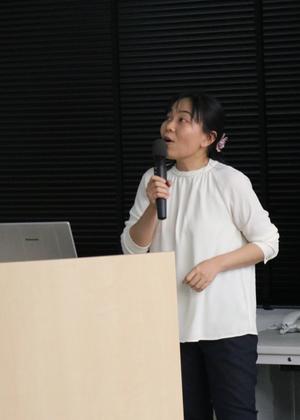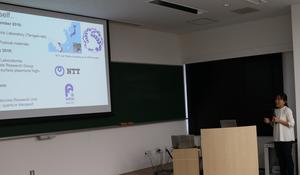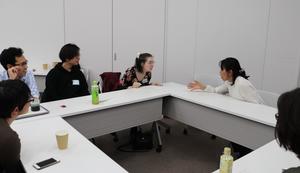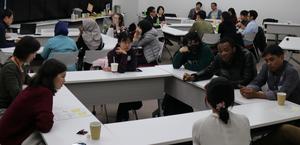Division for International Research and Educational Cooperation
Graduate School of Science and Faculty of Science , Tohoku University
Home > Voices from Alumni > Work and life in Japan after graduation (Dr. TU Ngoc Han, Class of 2016)
Voices from Alumni
Work and life in Japan after graduation (Dr. TU Ngoc Han, Class of 2016)
DiRECT invited Dr. TU Ngoc Han, IGPAS alumnus (Class of 2016) as one of the guest speakers for IGPAS Gathering 2020.

Dr. TU Ngoc Han was born in Vietnam and came to Sendai in September 2011, to study physics under the supervision of Prof. Katsumi TANIGAKI. It was the year that the Great East Japan Earthquake occurred, and the IGPAS results notification was released right before the disaster. Even though everyone closes to her such as family, relatives, and friends, did not want her to go Japan, she still decided to pursue her academic path in Tohoku. Looking back, she is now content, and feels that she made the correct decision. Reading the following article, you will find that her decision then, was even more than that.
|
TU Ngoc Han |
| << Presentation >> |
- Brief history
During 2011-2016, she belonged to the Nano Solid State Physics Laboratory (Tanigaki-lab), where she mainly conducted researches on physical materials. Right after graduation she joined the Quantum Physics State Research Group at NTT Basic Research Laboratories, where she spent three years for research on surface plasmons/high-frequency transport, etc. Last summer she moved to the Quantum Electron Devices Research Unit in Riken, and has been performing research on quantum transport since then.
- Her reasons for staying in Japan after graduation:
In addition to evaluating Japanese research facilities as top class and ideal to continue her academic career, she put high marks to other aspects of Japan, e.g., safe, good health care system, and four seasons. Also, the newly implemented status of residence, "Highly-Skilled Foreign Professionals", to which she was soon to be applicable, was another encouragement.
But more importantly, she has a personal reason that made her stay in Japan... she fell in love with a Japanese person!!
- Her effort and its outcome
She was determined to find a job in Japan. As the shift in her target, from her home country to Japan, was so sudden and there were only six months to go toward graduation, everyone commented that it would be too late. But she plunged into the internet search, found companies she wanted to apply for, and started sending e-mails and CVs.
Referring to websites on how to write a good CV, she always aimed high.
She read through companies' web pages to understand their spirit and mission, showing in their slogans. To her, the most important thing is to show your own life goals are close to the company's. She wrote many CVs in this elaborate manner and sent them to companies and research/academic institutes, along with meticulously prepared cover letters. To her surprise, many of them responded to her communications, and eventually, she successfully got a position in NTT.
- Helpful Tips for students
• Have answers for THREE common questions for interviews:
"What are your skills?", "Do you like these skills?", and "Why do you want to work with our company?
• DO NOT limit your time and effort that you invest in your job search• DO NOT limit yourself in a small research field which is in line with your thesis.
Since you have background knowledge, you can try new things.
• Directly go to the website of the company: most of companies have their recruitment website
•Make use of informative online sites, such as "JREC-IN", "Glassdoor", "Science Careers", etc.
| << Group Talk -- FAQ and more >> |
Q: How were you able to manage your time, writing research papers for publication, as well as doctoral thesis, and job hunting all at the same time?
A: It is a key to make your professor understood how it is important for you to start job hunting. About papers and thesis, I always tried to have two ideas in parallel: one big beautiful idea for my supervisor which I am not sure when I could make it, and one smaller idea which should be good for my research paper.
Q: Who did you ask to write the recommendation letters?
A: My supervisor. And I have asked two examiners of my thesis to be my references. Aside from the supervisor, examiners are ideal for this, because they know the details of your research very well. Right after my defense, I visited their office in person, explained my intention for the job carefully, and asked them if I can put their names in my CV. When applying companies, it is more important to have a good reference than having a good recommendation letter, because they call or send e-mail to the reference to know how he assesses the applicant. Naturally, you should keep them well informed, for them to fully comprehend for which company you are applying, and when you get a good result, of course, you should convey the good news and thank them.
Q: How different is your current research from your studies while in the PhD program? And if they were widely different, how have you been coping with it?
A: It is completely different. And, it was quite difficult in the beginning, almost overwhelming. When I faced large numbers of brand-new, expensive looking machines I had never touched, I was intimidated.
But if I can share something with you from my experience, I should say, "don't worry, you have background". Everything has its mechanism and once you have to understood the mechanism, you are able to handle it; your background teaches it. Be confident!
Q: Are the research environments different from one another, between company and research institute? And how do you like it?
A: The biggest difference I have found so far is how to keep track of time. The company I belonged to strictly controlled our working hours, while in the current institute, there is almost no rule and it is each researcher that decides when to work. Though at first, I had difficulty in coping with the strict time management in the company, after some time I got used to it and found it comfortable.
Q: Do you have any difficulty to get along with Japanese colleagues?
A: I think I am very lucky to have wonderful colleagues most of the time. As Japanese people are known to be very shy, you should take a step forward and start the conversation. Also, do not hesitate to ask their help, and their opinion... if you have trouble in your experiments. Based on their background, they can give you many useful advices. Please remember that as being experts, you have a lot in common, so many things to talk about and share. Be active if you want to make friends.








